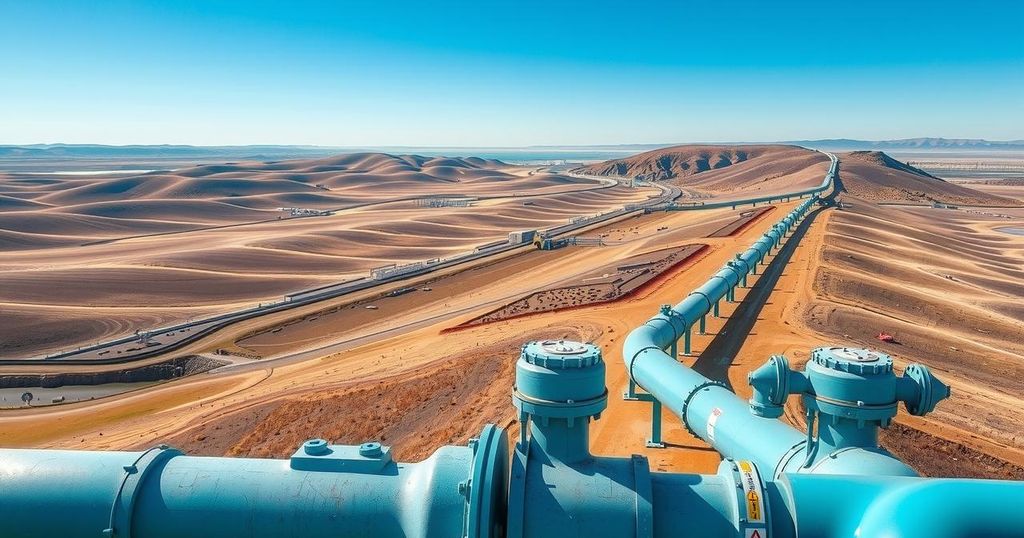President Félix Tshisekedi of the DRC has proposed a partnership to U.S. President Trump, linking military aid with access to vital minerals. His letter underscores the importance of U.S.-Congo cooperation against the M23 rebels, while promoting the DRC’s resources essential for high-tech industries. This proposal might reshape U.S. foreign policy in Africa and signals a new diplomatic strategy aligning military support with economic benefits.
On February 8, 2025, President Félix Tshisekedi of the Democratic Republic of the Congo (DRC) proposed a partnership to U.S. President Donald Trump, connecting military assistance to access to the DRC’s rich mineral resources. This proposal aims to enhance security for the Congolese army against the M23 rebel movement, allegedly backed by Rwanda, while facilitating U.S. interests in essential minerals like cobalt and lithium, critical for various industries.
In his letter, Tshisekedi highlighted the significance of a formal security agreement while emphasizing the DRC’s mineral wealth, stating, “Your election has ushered in a golden era for America… Our partnership will provide the U.S. a strategic edge by securing vital minerals from the Democratic Republic of Congo,” as noted by The Wall Street Journal. This partnership could serve as a catalyst for enhanced U.S. geopolitical influence through access to essential resources.
The DRC is a crucial supplier of cobalt and lithium, which are indispensable for producing smartphones, electric vehicle batteries, and high-tech devices. Major companies such as Apple and Intel depend on these minerals. Tshisekedi’s spokesperson further declared, “It is in our mutual interest that American companies, such as Apple and Tesla, source minerals directly from the DRC,” indicating the potential for direct economic benefits.
Furthermore, Tshisekedi is in discussions with Eric Prince, founder of Blackwater, about possible collaboration on improving tax revenue collection from mining operations. This cooperation could stabilize the Congolese economy and accommodate U.S. interests in the resource-rich region.
As the DRC contends with the ongoing threats posed by M23 rebels who have captured strategic cities, Tshisekedi’s outreach to Trump signals an urgent need for military support while illustrating economic motivations behind U.S. involvement. The specifics of military assistance sought remain undisclosed, as both parties have refrained from elaborating on the discussions.
International relations experts are monitoring this unique proposal closely. They recognize the potential for a strengthened U.S.-Congo relationship, given the interplay between military aid and resource acquisition, which might reshape foreign policy in the region.
This development prompts vital inquiries into the future of U.S. engagement in Africa, where nations laden with resources often navigate the intricate balance between domestic welfare and foreign influence. Tshisekedi’s approach, depicting military support and resource access as interconnected, may redefine diplomatic strategies for the DRC and the continent at large.
As negotiations continue, the implications of Tshisekedi’s offer may extend beyond the DRC, reflecting a potential shift in how countries might engage over natural resources in exchange for security. This situation could compel the U.S. to invest further in stabilizing the DRC, which would significantly affect its strategic posture in Africa.
The stakes are elevated amid the global demand for commodities and resource sustainability. Tshisekedi’s diplomatic outreach reveals awareness of the interplay between military support, economic necessity, and geopolitical dynamics in contemporary relations. This moment represents a pivotal point in U.S.-Africa engagement, merging military aid with economic opportunity and possibly establishing a new paradigm for future partnerships. How this partnership evolves in light of domestic and international pressures remains to be observed.
The proposal made by President Tshisekedi of the DRC to U.S. President Trump illustrates a strategic intersection of military assistance and access to valuable mineral resources. With the potential to reshape U.S. involvement in Africa, this offer not only highlights the geopolitical leverage based on mineral wealth but also raises critical questions about the long-term implications for U.S.-Congo relations. The unfolding of this partnership could set new precedents in how nations engage regarding security and resource management.
Original Source: evrimagaci.org




